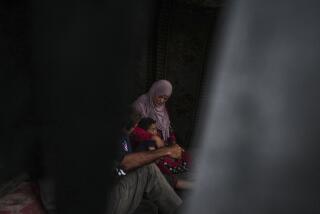Fasting as Her Elders Do
- Share via
With henna-stained hands, Momina Din followed the curvy, Arabic lettering in the Koran cradled in a carved wooden stand. As she read excerpts aloud, her grandmother, Bilquis Jehan, corrected her pronunciations and fussed over her, tucking tendrils of hair back into the sheer gold scarf covering the young girl’s head.
Jehan, 65, came from Pakistan to attend to 10-year-old Momina during her first fast--called Roza Kushai in Jehan’s native language of Urdu. It is a rite of passage that welcomes a young Muslim girl into the grown-up world of discipline and self-control.
Daytime fasting is required of Muslims during Ramadan, the holiest of Muslim holidays, which began Dec. 20 and will end in late January with a joyous breaking of the fast, called Id al-Fitir.
It is estimated that 1 billion Muslims around the world will take part in the monthlong fast by refusing all food and water from sunup to sundown to help them learn self-restraint. Ramadan celebrates the revelation of the Koran, Islam’s holy book, to the prophet Mohammed.
It is up to Muslim parents to decide when a child has become mature enough to appreciate what sacrificing sustenance means.
A fast is required by all Muslims except children who haven’t reached puberty, the elderly and pregnant women. Muslim children are required to begin fasting at the age of 12, although some begin fasting as young as 6. Often, the pressure to fast comes from the children themselves: They see it as signifying the discipline and self-control of adulthood.
“Parents normally don’t push their children to fast,” said Muzammil Siddiqi, director of the Islamic Society of Orange County, located in Garden Grove. “The kids are the ones who get excited. There’s peer pressure from other kids too.”
On Sunday, the sun sank into the horizon as hundreds of Muslims gathered for daily prayer at the society’s mosque. The call to prayer was followed by a party in honor of Momina’s first fast.
As she sat in a chair on a platform decorated with colorful streamers and encircled with lights, Momina paused to reflect on the moment.
“I can fast and stuff like that, like grown-ups do,” said the Garden Grove girl, who admitted she was also a bit nervous. “It’s my first time and I’m, like, not used to it.”
While fasting is revered, it is also cause for concern. Zahida Aslam of Westminster said it’s her 8-year-old daughter, Samara, who’s determined to fast with her friends.
“I brought my daughter lunch,” said Aslam, as she waited Thursday in the Hill Elementary School’s lobby with a lunch sack containing a banana and a hamburger for her daughter, who attends school with Momina. “I’m worried that she may get dehydrated, that she won’t be able to study.”
But the girl refused it.
“I want to fast,” said Samara with a groan and a roll of her eyes. “With everybody else,” she added.
Another of Momina’s schoolmates, Sobia Saleem, 10, of Garden Grove, had her first-fast celebration when she was 6. “We fast because we need to feel how the poor feel,” she said. “It teaches me patience. Usually, I’m not patient when I want to eat.”
When youngsters fast for the first time, far-flung families come together, bearing gifts and money for the child. Momina’s cousin, Mubashir Ahmed of Las Vegas, flew to town for the event, and spent hours preparing sweet delicacies that are made out of ricotta cheese, traditional snacks eaten at the end of the day’s fast.
Momina proudly showed her gifts, including a Winnie-the-Pooh watch, a mini-backpack and a Barbie Play-Set.
The biggest challenge for Muslim children keeping the fast comes at lunchtime when they are at school and surrounded by other kids slamming open lunch boxes and fetching hot lunches from the school cafeterias.
The fasting can also take a visible toll. “Sometimes the kids are a little drowsy in the afternoon,” said Hill Elementary School teacher David Hoppes, referring to Momina and the six other Muslim students in his classroom. “They get very thirsty. Not having fluids is the hardest on them.”
Jerry Horkin, principal at Momina’s school, said teachers are trained to be sensitive to fasting Muslim students. For example, Momina’s teachers avoid using food incentives--such as handing out treats to high-scoring students--during the month of Ramadan, so Muslim children won’t be distracted.
Siddiqi said teachers and parents also carefully monitor children who are fasting, adding that religious law permits Muslims to break the fast if they feel ill.
Momina has broken her fast only once, one day this week when she felt sick. But on Thursday she sat in stoic restraint next to a friend who munched vegetable spaghetti and sipped strawberry-flavored juice as the pair sat on a wooden bench in the schoolyard.
The quiet 5th-grader said that not even her favorite food--pizza--will tempt her now that she’s fasted and been indoctrinated into the adult world: “I feel proud of myself that I’m a Muslim.”
More to Read
Sign up for Essential California
The most important California stories and recommendations in your inbox every morning.
You may occasionally receive promotional content from the Los Angeles Times.













